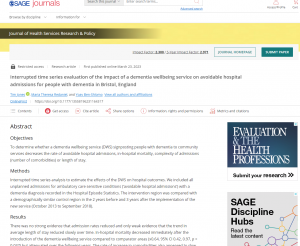Evaluating the Bristol Dementia Wellbeing Service
The Bristol Dementia Wellbeing Service (DWS) is a partnership between the Alzheimer’s Society and the Devon Partnership NHS Trust to deliver dementia services in Bristol. It is commissioned by the Bristol, North Somerset and South Gloucestershire Clinical Commissioning Group. Since 1 April 2015, it has provided support to people with dementia, their carers, GPs, and other health professionals.
The service assigns a dementia practitioner and a dementia navigator to each GP practice. They help with diagnosis and therapies, as well as directing people with dementia and their families to information, guidance and support. The practitioner and navigator also help develop a wellbeing plan. This plan outlines the person with dementia’s medication and support needs, and activities to enhance quality of life.
What we did
We analysed data from before and after the Bristol DWS was introduced (April 2014 – September 2018) as well as data from other geographical areas that didn’t have a similar service, to explore the impact of the service on various aspects of hospital admissions:
- admission and in-hospital mortality rates
- complexity of hospital admissions
- length-of-stay
What we found and what this means
This evaluation was commissioned as an exploratory project to test an analytical process that Bristol DWS hope to use further into the life of the service. The data used is based on a limited time period, due to limitations of the available HES data. The first year of service delivery was particularly challenging, as our first evaluation highlighted. While our report highlights some interesting results, it is clear that interpretation of these is done with considerable caution. We also note that these results only form part of the bigger picture of the DWS Service Evaluation, and should not be used in isolation.
With this in mind, there was a downward trend in the number of concurrent conditions that patients were admitted to hospital with after the Bristol DWS was introduced, compared to the other areas. There was also an immediate, moderate reduction in the hospital mortality for all admissions and ‘ambulatory care sensitive admissions’ when compared to control areas. Ambulatory care sensitive conditions (ACSCs) are conditions where effective community care and case management can help prevent the need for hospital admission. There was little evidence for an impact on the number of hospital admissions or length of stay, at least in the short term.
It is unlikely that the reduction in mortality was as a direct result of the service, as this would also have resulted in reduced length of stay. We wouldn’t expect to see the benefits so rapidly without further improvement over time as the service became more developed and integrated.
The dementia wellbeing service was established to improve quality of dementia care – reducing hospital admissions was never its sole purpose. More targeted interventions may be required to reduce hospital admissions for people with dementia.
Paper

Interrupted time series evaluation of the impact of a dementia wellbeing service on avoidable hospital admissions for people with dementia in Bristol, England
Read the paperLead collaborators
- Stephen Collings, Bristol Dementia Wellbeing Service
- Shaun Popel, Devon Partnership NHS Trust
- Tobit Emmens, Devon Partnership NHS Trust
ARC West Staff
Professor Yoav Ben-Shlomo
Cross-cutting Methodological Theme LeadPartners on this project
Bristol, North Somerset and South Gloucestershire Integrated Care Board
The Integrated Care Board (ICB) is responsible for the day-to-day running of the NHS. The NHS Bristol, North Somerset and South Gloucestershire ICB takes account of population needs, arranges for the provision of services and manages the NHS budget.
